Author Spotlight
Needing Earl M. Rauch
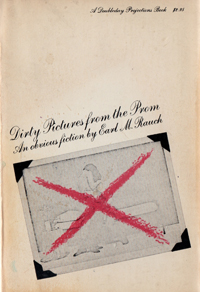
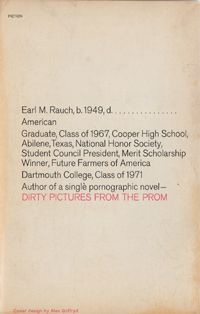
I discovered Earl M. Rauch’s Dirty Pictures from the Prom on a miserable snowy day this January (2013). As is occasionally the case, I decided to spend said miserable snowy day inside as much as possible—it was a Friday, and after finishing up the day’s classes I wandered over to an antique store in Eau Claire, Wisconsin; a place not known exclusively for its cultural presence (Bon Iver lives here, I guess, some fantastic sauce is made here at Silver Springs, and before dying in a plane crash several days later Ritchie Valens, Buddy Holly, and J.P ‘The Big Bopper’ Richardson played here at a building that’s now defunct). This antique store is massive, and awhile ago I used to come here and collect old issues of Esquire with pieces by Hemingway, Fitzgerald, and the like, as well as old paperbacks I’d never heard of. This particular day I already held two Iris Murdoch hardcovers before looking at a shelf on my way out and seeing a spine that read in a florid cursive ‘Dirty Pictures from the Prom Earl M. Rauch Doubleday’ and already having a copy of Under the Net at home I still had yet to read, I dropped the Murdoch books immediately and picked up this strange text.
While in the store I looked up Earl M. Rauch and discovered the book for sale online for prices seldom lower than 100 USD; this made me want to buy it. He was also a largely unknown person who apparently wrote this—his magnum opus, though not his only contribution to mankind’s literary heritage (more on that momentarily)–when he was only nineteen years old; that, plus the heft of this obviously well-conceived novel, made me want to buy it even more. Then further reading in various biographical pieces about Rauch and his prodigious fascination with writers like Pynchon, made me decide that this was the only book I’d ever truly need and that I’d spend the weekend doing nothing but reading it from cover to cover. And so I did.
Some notes on the technique:
1. This book is largely comprised of a straightforward, picaresque narrative about a character named (Osgood) Barnaby Saltzer. Chapters begin and end and as a result you’ve moved on several moments/months/years in his life and been entertained along the way. However, Barnaby had a younger brother named Creynaldo–a prodigious genius, having died when he was only seven and already written many cherished works–and the book features a great deal of his poetry/drawings as well. Furthermore, at the end of many chapters–and before a few, later on–there are notes from conversations between this story’s author Barnaby Saltzer, and his editor; hence the occasional portions where large X’s are printed through entire pages that the editor deemed unworthy–a practice of ‘bracketing’ in the deconstructionist tradition that only serves to make you read harder.
2. Though obviously influenced by the Pynchon novels available at the time (1969) in his extremely funny descriptions of a dangerous and fast-paced America, I daresay Rauch achieved something entirely novel with this work. This is apparent on the cover, ‘An Obvious Fiction,’ calls to mind the typing of Exley’s A Fan’s Notes as ‘A Fictional Memoir’. Rauch seemed to know at an extremely young age that he’d achieved something unprecedented in this regard. Of course variations on this theme of the broken and commented-upon narrative existed, but not quite like this and very seldom in a package as successful as Dirty Pictures.
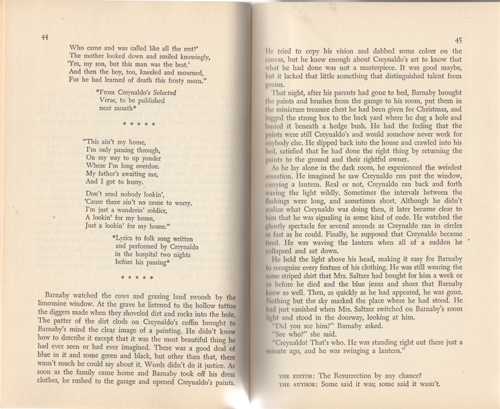
Now for an attempt to describe its content and my reaction:
1. I need to tell you that at every turn of the page this book gave me exactly what I needed it to give me. This is merely a selfish digression before encapsulating the story but this has happened so few times in my life (Celine comes to mind, Robert Stone’s Children of Light, and Exley) that I cannot begin without explaining it.
2. Barnaby Saltzer’s younger brother Creynaldo dies when he’s seven years old having already written several masterpieces and painted paintings that come to sell for thousands of dollars. At one point before the book really gets underway, when he’s only five years old Creynaldo is accidentally left in the garage with a large amount of uncovered paints:
“By the time they remembered that Creynaldo had been playing out there all day, it was too late. Creynaldo had already painted a mural of the Crucifixion on the garage floor. It was truly a gorgeous piece of work. The colors were lovely, and the attention to detail was amazing. Jesus looked very realistic.
At first, Mr. and Mrs. Saltzer were angry, but no one could look at the mural for any length of time and remain angry because that’s just how beautiful it was. Mr. Saltzer knew an art professor at the community college, and he called him out to the house one night to have a look at the painting. The man’s name Barnaby never learned, but he did recall that when the prof saw the garage floor and was introduce to Creynaldo, he declared that the idea of Creynaldo’s being the creator of such a masterpiece was preposterous. Eventually the entire floor had to be replaced, as people kept sneaking in and chipping away at the Messiah.” Pages 8-9
3. Though it only occupies the first fifty or so pages of the novel, Barnaby’s relationship with his brother and his eventual death is one of the prime motivator’s for the story itself. Barnaby goes on to eventually develop an interest in the arts himself and the ever-looming presence of his genius brother often foils his efforts as he assumes he’ll never transcend his work. (Note: Dirty Pictures from the Prom is seen as a book written by Barnaby Saltzer, and hence is referred to throughout at Saltzer’s big break, so to speak)
4. I said before that this was a picaresque, and although I often hope to avoid terminology like that in reviewing anything it fits here better than most places. Barnaby’s life is described through his teen years and into college, from which he eventually escapes into Mexico where he’s detained and antagonized by a bizarre gang of Neo-Nazi marauders until managing to get away and into the states again. Along the way he’s raped and assaulted by a little person, goes on a date with an African American gal at a barren diner in the middle of nowhere before the only three other patrons rape the girl and leave Saltzer there beaten to discover her body later.
5. A perfect balance of the terribly bleak landscape of America at this point in history balanced against the relentless self-seeking escapades of Saltzer in an attempt to evade the legacy of Creynaldo and find a life that might finally be his and his alone.
6. Themes throughout relating to extremely Freudian issues (latent homosexuality explored in the bizarre little person episode, maternal preoccupations galore, etc.) and sibling rivalry that do give the book a center although its brilliance in creativity and style made my first reading quick and slack-jawed and hence conjuring up memories of the text is more difficult than it should be.
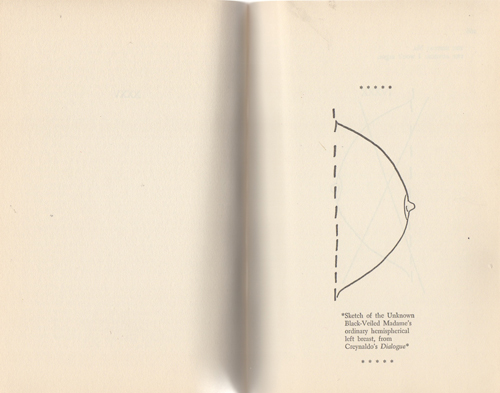
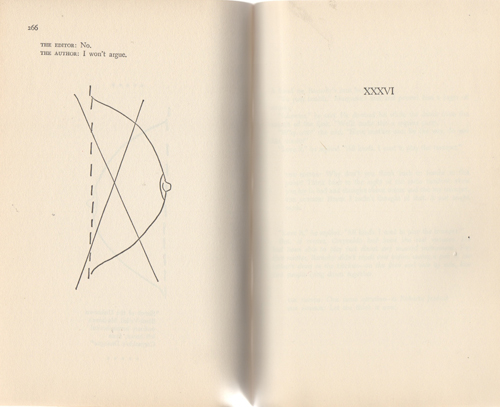
7. My second read-thru involved a great deal more focus on the portions of the book featuring massive X’s through them (they are plenty) and I was reminded of that oft-quoted Basquiat explanation of his lines through certain words on paintings, that it drew attention to words and made them more important. Basically a restating in so many words of the deconstructionist idea although rather than drawing our attention to the flimsiness of language Basquiat seems to hope to make them matter even more than they would sans lines, that’s how I feel Rauch uses them.
8. Call it a picaresque and you’re doomed to keep trying to find moments throughout that call to mind that word/its connotations. It’s not exactly bad. Basically, were David Foster Wallace at the prime age of nineteen right when Rauch was and had he attempted to write his Catcher in the Rye, something vaguely reminiscent of Dirty Pictures would’ve resulted. But we don’t have Wallace of age in time, we have Rauch, and interestingly enough one has died literally, while the other has largely been written off figuratively from our consciousness. It seems he was interested in a degree of anonymity even at the time of its publication, and hence one doesn’t feel compelled to anger when thinking about the potential literature that might be hidden away in his file cabinets. Even further, perhaps a figure like Creynaldo did exist, and Barnaby is actually Rauch himself and his contribution to the arts is all we’re likely to have considering the looming presences of his deceased brother. I don’t know, but I can’t say I don’t wonder about it. It’s as if Barbara Newhall Follett had written a gigantic book that I actually loved (I definitely like her writing, but ‘love’ seems a stretch), then dabbled in Hollywood for a bit and only then wandered off into the woods. I don’t know. It’s nice to think about this sort of thing.
9. Rauch has written four screenplays for films that have probably given him a decent living but I feel like he’s probably either used pseudonyms or is perhaps working for the government I don’t know. They are:
I. New York, New York (Scorsese 1977)
II. A Stranger Is Watching (Cunningham 1982)
III. The Adventures of Buckaroo Banzai Across the 8th Dimension (Richter 1984)
IV. Wired (Peerce 1989)
- I have a hard time caring about this film as a piece of Scorsese’s oeuvre. I dunno. De Niro gives a great performance as a saxophone player who meets Liza Minelli, a struggling musician, and I’ve bored myself to tears just writing this. It’s not a great film. Coming off of Taxi Driver it’s a steaming pile of shit that should never have been made. It happens. Coppola has directed a lot of terrible fucking movies but nobody cares. It’d be rad if Rauch had somehow written Taxi Driver, although obviously that’s stupid. Either way, he probably got several thousand dollars and sustained a life as Batman so right on. Good form.
- I have a soft spot for this one. It’s directed by the guy who did the first Friday the 13th films and I have an extremely spacious soft spot for those films. Here is Rauch adapting a Mary Higgins Clark novel for the screen which means that he’s kept at least slightly in touch with literary circles. I don’t like Mary Higgins Clark but that doesn’t matter. This movie reminds me of Bill Lustig’s Maniac and that movie fucking rules so I guess we’re home now wake up.
- I FUCKING LOVE THIS MOVIE. Imagine if Alejandro Jodorowsky got together with a very lost Ridley Scott mid-Bladerunner filming and played him all of Devo while describing some interplanetary adventure they’d film together. That’s sort of what this movie is, maybe, kinda. Featuring none other than Peter Weller of Robocop/Naked Lunch fame, this movie came about much in the way Kubrick/Clarke’s 2001 came about. Its director, an alumnus of Dartmouth like Rauch, read Dirty Pictures and loved it enough to write to him. Rauch in turn expressed his interest in screenwriting and the two collaborated one what has recently become one of my favorite goddamn movies. All the surreality of El Topo or The Holy Mountain with a playfulness and humor unmatched. Dammit, I love this movie. Rauch also wrote a novelization of it that can be purchased for far less than Dirty Pictures that I highly recommend. Not your typical novelization fluff but the work of an author coming back to his task in an awesome, and fucking hilarious, way.
- I dunno, man. That oaf from The Shield playing John Belushi? Jesus… That is exactly the frame of mind I approached this film with, and although I was obviously disappointed because this is the case of an established journalist (Bob Woodward) writing a book that would obviously sell fine because its star had just died two years before and a director jumping at the chance to adapt it for the screen, I’ve gotta say that there were occasional redemptive moments that made me hate this eons less than I did, say, all the other shit I’ve hated (I’m tired). Chiklis did a decent job and the writing is a logical pace for a drugged-out biopic of a comic icon but I’m in no hurry to assert that this is what Earl M. Rauch should be remembered for when all’s said and done.
And just what the hell should Earl M. Rauch be remembered/appreciated for:
- Being basically the most impressively-prodigious author I can call to mind. Fuck Jack Kerouac and the perceived ‘innovation’ in something like On the Road. This is an erudite, strange, entertaining and love-filled novel from an extremely intelligent (then, and now, duh) young man who has since felt no need to return to this sort of thing.
- Writing a handful of films that, for their part, were basically good (and occasionally fucking MAGNIFICENT) and certainly excellent as far as hints of Rauch’s writing can be perceived through the medium.
- Perhaps as an inspiration that literature cannot be close to dead: i.e. if this (then) nineteen year old can write something so impressive and so affecting that over forty years later, in some random-ass antique store in Wisconsin, a depressed fellow can pick it up and have it lord over the next (considerably more blissful) weeks of his life, and yet most people have yet to even read the thing, how can all ground have been covered by the novel?
- I’m tempted to develop some way of loaning this book out to anyone who might like to give it a chance. Maybe I will. I don’t want to post my email on this post cos that’s kind of weird. But anybody that I know you can definitely contact me and we’ll figure something out. I can’t bear the thought of parting with this thing completely, but I want to share its splendor. I’ve only taken a crack with this review. If anybody knows of a decent PDF of the thing I encourage posting it in the comments.
Thank you. My apologies for perhaps glossing over any in-depth descriptions that might have made the book Dirty Pictures from the Prom more real for you as a reader of this review. I’ve expressed before my inability to do this from time to time. My hope is the inclusion of images might help. I love you, and I want to help you out wherever I can.
P.S. if you dig William Gibson this is an old promo video of Gibson, Rauch, and Timothy Leary discussing the possibility of an adaptation of Neuromancer written by Rauch that I would cut my left hand off to see.
***
Grant Maierhofer is the author of Ode to a Vincent Gallo Nightingale, he blogs at miredingriefmiredingrief.
Tags: Dirty Pictures from the Prom, Earl M. Rauch, Grant Maierhofer

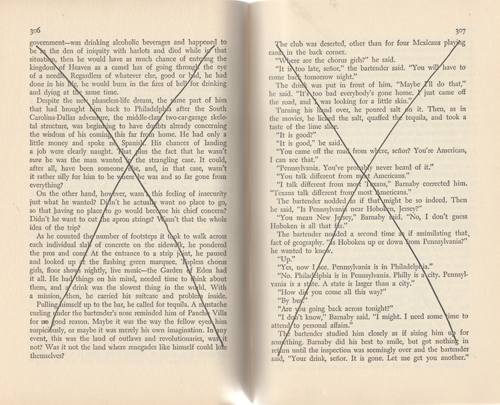
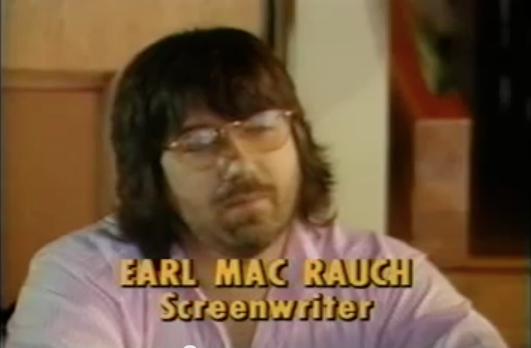
Huh. Want to read this now.
Yeah, second. I saw the Buckaroo Bonzai paperback in a Goodwill, and
now I’m sorry I didn’t pick it up when I had the chance.
You can check it out the ebook at openlibrary.org, I’m reading it now. That’s the only place on earth I could find it.
[…] For more thoughts on Rauch, here’s Needing Earl Mac Rauch. […]
[…] Needing Earl M. Rauch. […]